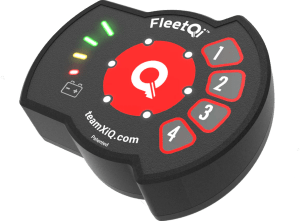For Atlantans accustomed to battling interstate traffic, a three-mile commute may seem like a dream.
But it’s one that more people around the world are making a reality, says XiQ co-founder and CEO Karlos Walkes, and they’re increasingly aligning their transportation choices accordingly.
That’s an opportunity for XiQ, short for ElectronixIQ, an Atlanta-based startup making the patented FleetQi device to replace the keyed ignition in golf carts.
Blending hardware and software, the FleetQi instantly converts electric carts to a push-button start, but beyond convenience, it also unlocks opportunity by creating a sort of operating system for owners and fleet managers.
“Imagine a Roku for your television. It’s almost the equivalent — this device will allow the vehicle to do more and allow the user to do more with their vehicle, because they’re demanding more,” Mr. Walkes said during an Atlanta International School sustainability event organized by Global Atlanta.
For golf courses, this solves an immediate need while paving the way for future revenue growth.
 Karlos Walkes
Karlos Walkes
“Five keys operate 90 percent of golf carts,” Mr. Walkes told Global Atlanta, noting that the industry has failed to keep up the tech advances seen in cars. “That’s why theft is such a huge problem.”
Beyond security, however, lies connectivity. With a simple ignition changeout, connecting via Bluetooth to a smartphone, the owner of each golf cart — or forklift, boat or excavator for that matter — now has the ability to secure, track, control and manage their asset, generating valuable usage and geolocation data that can be monetized in various ways. XiQ’s intellectual property protects the way the device connects with a smartphone.
“We’ve identified that invisible market that you should have access to,” Mr. Walkes said of the non-automotive space. “It’s removing friction. It’s more efficient. But most importantly, it opens up more monetary opportunity by bringing data to the game.”
As manufacturers like Georgia-based Club Car and EZ-GO, or recreational vehicle makers like Yamaha and Polaris, better understand the way their vehicles are used, they can dream up better ways to target consumers across channels. Fleet managers, meanwhile, can use XiQ to control access to their vehicles, enabling Turo-style rentals, or simply to monitor where the vehicles travel and improve efficiency.
And then, there’s the environment: Getting rid of the key is what Mr. Walkes believes will open the door for world-changing impact.
XiQ’s sustainability strategy has a few layers: For one, by introducing modern technology that consumers expect but non-automotive OEMs have been loath to tackle, the company aims to keep electric golf carts on the road longer, reducing the baked-in emissions of new vehicle purchases.
But the real benefit shows up when a small EV can replace a gas-powered car, either on a single trip, or optimally, as an overall vehicle of choice that fits with the driver’s ongoing lifestyle.
 FleetQi provides a push-button start, replacing basic keyed ignition for golf carts.
FleetQi provides a push-button start, replacing basic keyed ignition for golf carts.
The latter is what XiQ is hoping to drive. Some 1.25 million golf carts are already in use around the U.S., with 15 percent of them used daily. XiQ’s data can help policy makers increase use of the remaining 85 percent by helping owners (and manufacturers) understand where they can already drive their carts on public roads and how to further outfit them for street-legal use.
“Because we’ve literally figured out how to touch this market with the hardware, we can move the data to enable governmental institutions to understand, ‘Well, how can we utilize these vehicles that are being used by these individuals to promote emissions reduction?’” Mr. Walkes said.
Without putting any additional EVs on the road, XiQ believes the deployment of its devices in existing vehicles, in the U.S. alone, can reduce emissions at a level equivalent to removing 100,000 gasoline-powered cars per year.
Teeing Up Global Opportunity
Beyond the American market — and even beyond golf courses — the opportunity is vast, especially in the Middle East and Asia, where communities are being designed from the ground up with clean-energy transportation in mind, Mr. Walkes said.
Golf carts “are no longer luxury items. They’re utility vehicles,” he added.
Buoyed by pilot programs and contracts with major golf cart rental outfits and distributors, as well as participation in one of the early cohorts of the Comcast Sportstech Accelerator, XiQ is pursuing a distributor in Dubai to tap into the construction boom in the Gulf region.
In the ritzy enclave of Monaco, he added, there’s a move to “enable watercraft as alternative transportation, to transition away from the limitations of roads to waterways … and they’re moving with our technical technology to enable that,” he said.
In Europe overall, the sale of FleetQi is a “value-driven conversation,” meaning that companies understand the device not only for its immediate utility, but for its climate and commercial possibilities. “This fits with what we want to do.”
Mr. Walkes admits that with the hardware alone, his business could eventually hit a “brick wall,” but the FleetQi is the first step in a quest XiQ has undertaken to enable connection, communication, then commerce, following the model that car makers and gig-economy platforms capitalizing off data based on underlying assets. XiQ’s FleetQi device, formerly known in the industry as the Stinger, is manufactured in Norcoss.
“We have a model that’s prepared for adaptation, for evolution, and that means survival. But in this process, we’re not just surviving, we thrive.”
From the archive:







